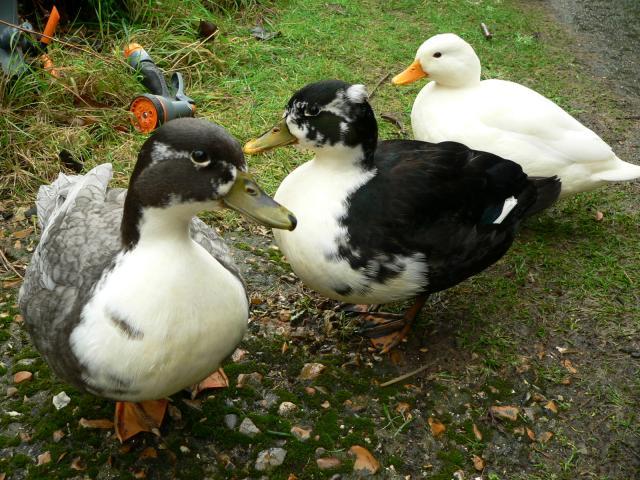Hi, Priss,
I am new to this forum, and at the research stage myself, but I have been reading up on duck nutrition (plan to order my Indian runners tomorrow

Anyway, my favorite source for nutrition information is Storey's Guide to Raising Ducks by David Holderread. He points out that grains are a fine part of a duck's diet, but they don't provide all the nutrition needed. There are pages and pages of information about sources of nutrition, types of purchased feed, and so forth. If you can get your hands on a copy of this, I recommend it.
From what I have seen you post, it looks like you are doing pretty well, since nutritional deficiencies show up in ducks' health and yours seem fine. I wonder, though, if their diet was a little low on protein before you got the pellets. Short term that may not be too bad, but adult ducks need the right amount of protein in their diet, from purchased feed, powdered milk added to feed, insects, or some other source.
Growing ducks (weeks three through eight) are recommended to receive about fifteen percent protein, developing about thirteen percent, and maintenance about twelve percent. As I mentioned, there is so much information, such as when ducks need more calcium and how much is too much.
As concerned as you are, I think you and the ducks will be fine, since you seem to avoid taking anything for granted.
I am new to this forum, and at the research stage myself, but I have been reading up on duck nutrition (plan to order my Indian runners tomorrow

Anyway, my favorite source for nutrition information is Storey's Guide to Raising Ducks by David Holderread. He points out that grains are a fine part of a duck's diet, but they don't provide all the nutrition needed. There are pages and pages of information about sources of nutrition, types of purchased feed, and so forth. If you can get your hands on a copy of this, I recommend it.
From what I have seen you post, it looks like you are doing pretty well, since nutritional deficiencies show up in ducks' health and yours seem fine. I wonder, though, if their diet was a little low on protein before you got the pellets. Short term that may not be too bad, but adult ducks need the right amount of protein in their diet, from purchased feed, powdered milk added to feed, insects, or some other source.
Growing ducks (weeks three through eight) are recommended to receive about fifteen percent protein, developing about thirteen percent, and maintenance about twelve percent. As I mentioned, there is so much information, such as when ducks need more calcium and how much is too much.
As concerned as you are, I think you and the ducks will be fine, since you seem to avoid taking anything for granted.



